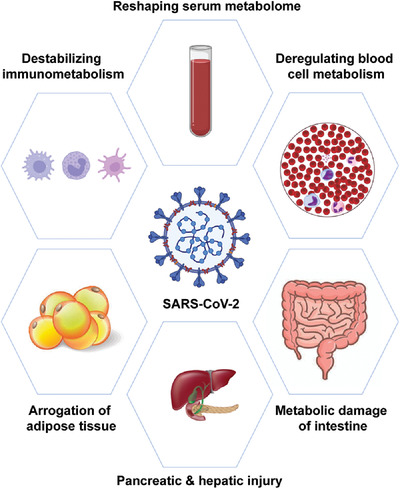COVID-19 metabolism: Mechanisms and therapeutic targets

Open the phone and scan
Severe acute respiratory syndrome coronavirus 2 (SARS-CoV-2) dysregulates antiviral signaling, immune response, and cell metabolism in human body. Viral genome and proteins hijack host metabolic network to support viral biogenesis and propagation. However, the regulatory mechanism of SARS-CoV-2-induced metabolic dysfunction has not been elucidated until recently. Multiomic studies of coronavirus disease 2019 (COVID-19) revealed an intensive interaction between host metabolic regulators and viral proteins. SARS-CoV-2 deregulated cellular metabolism in blood, intestine, liver, pancreas, fat, and immune cells. Host metabolism supported almost every stage of viral lifecycle. Strikingly, viral proteins were found to interact with metabolic enzymes in different cellular compartments. Biochemical and genetic assays also identified key regulatory nodes and metabolic dependencies of viral replication. Of note, cholesterol metabolism, lipid metabolism, and glucose metabolism are broadly involved in viral lifecycle. Here, we summarized the current understanding of the hallmarks of COVID-19 metabolism. SARS-CoV-2 infection remodels host cell metabolism, which in turn modulates viral biogenesis and replication. Remodeling of host metabolism creates metabolic vulnerability of SARS-CoV-2 replication, which could be explored to uncover new therapeutic targets. The efficacy of metabolic inhibitors against COVID-19 is under investigation in several clinical trials. Ultimately, the knowledge of SARS-CoV-2-induced metabolic reprogramming would accelerate drug repurposing or screening to combat the COVID-19 pandemic.
This paper eviewed recent advances in the metabolic interaction between SARS-CoV-2 and human body.

SARS-CoV-2 deregulates cell metabolism in multiple organs. The interaction between SARS-CoV-2 and human hosts remodels metabolic network to regulate viral infection and replication. Metabolism-based therapy holds promise in the combat against SARS-CoV-2.
Article Access: https://doi.org/10.1002/mco2.157
More about MedComm: https://onlinelibrary.wiley.com/journal/26882663
Looking forward to your contributions.


